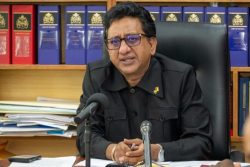Focus 2018 begins with a correction of a statement in Focus 2017 that Budget 2017 was the earliest national budget ever been presented in post-independence Guyana. In fact, the earliest was in 1975.
Budget 2018, the fourth by the APNU+AFC Government, continues the annual trend of a bigger budget over the preceding year. Budgeted expenditure for 2018 is projected at $267.1 billion, or 7.1% over total expenditure in 2017. This represents a 20.5% increase over 2016, the first full year of this Administration.
At June 30, the midyear report by the Minister of Finance had reported total revenue of $97.2 billion, expenditure (capital and revenue) of $97.3 billion, inflation of 1.1%, and real GDP growth of 2.2%.
The Minister reported that real GDP growth (2.9%) fell short of the 3.8% growth rate projected in the 2017 Budget as well as the revised, lower 3.1% projected in August 2017 on the presentation of the mid-year report. The Minister attributed the shortfall to “expected weak performance” in mining, quarrying, sugar and forestry. Despite this not insignificant shortfall, tax and other revenues increased by 8.7% which suggests a deterioration in the tax to GDP ratio.
The tax measures announced by the Minister were mostly positive and are unlikely to receive the kind of criticisms and hostility he received over the 2017 tax measures. The mining sector and the forestry sector will no doubt welcome the measures specific to their sectors while the removal of VAT on educational services will be seen as inevitable. While there is no increase in the personal allowance, the full allowance is available, whether or not employment is exercised for part of the year only.
During the year, there were three supplementary appropriations totalling $11.9 billion. Once again, the Minister took issue with the Auditor General whose 2016 Report had commented adversely on the use of the Contingencies Fund.
For 2018, current revenue is budgeted at $201.9 billion, capital revenue and grants of $10.7 billion, current expenditure at $188.4 billion, capital expenditure at $59.7 billion, debt servicing of $19.0 billion and an overall fiscal deficit of $54.5 billion, financed by domestic and external loans of $33.4 billion and $21.1 billion respectively. The revised 2017 numbers, which of course include some level of projections given that the year is incomplete, were mixed. Revenues are projected to surpass budget by $7.8 billion, offset by current expenditure falling short of budget by $1.5 billion, capital expenditure exceeding budget by $1.4 billion and the overall deficit being $8.5 billion less than budgeted. See table on page 32, Financial operations of the Central Government.
Ram & McRae tested the constant complaint of substantial underspending on the capital budget against publicly available information. In 2017 actual spending exceeded budget by 2.4% while in 2016, actual spending was below budget by 10.7%. However, in both years, spending in the second half of the year accelerated dramatically.
We find these numbers unbelievable and suspect that this is a clear case of a conspiracy to violate the provisions of the Fiscal Management and Accountability Act by senior government functionaries by leaving the Cash Book open and writing cheques on the old year well into the new year. The law requires that unspent funds at the end of the year should be returned to the Consolidated Fund.
Minister Jordan favours long Budget Speeches, covering almost every area of the economy and the society and providing minute details of plans, programmes and activities. Despite its length, the Speech was short on references to gender and youth issues, on the issue of unemployment across the economy, the continuing problems faced by Linden and the National Insurance Scheme, and on specific measures to restore the economy to robust growth.
With a second major catastrophe at the Georgetown Prisons in less than two years, the Minister sought to place the blame on the rioting of the prisoners and “their wanton act of violence and mayhem”. It is unfortunate that politics dictate that he could not attribute any blame and responsibility to the President and the Minister of Public Security for their failure to act on the recommendations of the Commission of Inquiry into the first catastrophe.
While the Speech focussed more on tax administration than on tax reform, the tax amnesty and the reduction of the sums to be lodged as a condition for a challenge against a tax ruling were among the recommendations of the Tax Reform Committee appointed by the Minister on assumption to office. Unfortunately, this Administration does not seem to regard income and wealth inequality as serious issues and accordingly there is nothing in the Budget that could be considered a pro-poor step.
Debate on the budget is scheduled to begin next Monday and the Appropriation Act passed before the end of this year. The Minister can expect the parliamentary Opposition to come hard at him, but unlike last year, he is unlikely to have a fight on too many fronts.









